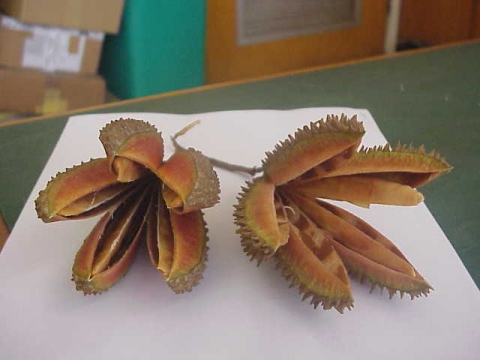Flindersia amboinensis
Poir
Rutaceae
Flindersia macrocarpa C.T.White & W.D.Francis ex Lane-Poole
Flindersia radulifera R.Br. ex Spreng.
Common Name:
General Information
Flindersia amboinensis is an evergreen tree that usually grows from 15 - 45 metres tall. The straight, cylindrical, unbuttressed bole can be free of branches for 6 - 8 metres and up to 50cm in diameter[
388- Title
- Guide to the Trees of Papua New Guinea
- Publication
-
- Author
- Conn. B.J. & Damas. K.Q.
- Website
- http://www.pngplants.org/PNGtrees/
- Publisher
-
- Year
- 0
- ISBN
-
- Description
- An Internet site giving good descriptions of the trees of Papua New Guinea.
].
The tree is harvested from the wild for its high class timber, which is traded.
The tree produces a vluable timber and the main threat to the species is logging. The plant is classified as 'Near Threatened' in the IUCN Red List of Threatened Species(2013)[
338- Title
- IUCN Red List of Threatened Species
- Publication
-
- Author
-
- Website
- http://www.iucnredlist.org/
- Publisher
-
- Year
- 0
- ISBN
-
- Description
- A list of plants under threat and facing possible extinction, usually with brief details of the threats and information on habitat.
].
Known Hazards
None known
Botanical References
388- Title
- Guide to the Trees of Papua New Guinea
- Publication
-
- Author
- Conn. B.J. & Damas. K.Q.
- Website
- http://www.pngplants.org/PNGtrees/
- Publisher
-
- Year
- 0
- ISBN
-
- Description
- An Internet site giving good descriptions of the trees of Papua New Guinea.
Range
Southeast Asia - eastern Indonesia to New Guinea.
Habitat
A sub-canopy tree in lowland and submontane rain forests; at elevations from sea level to 1,700 metres[
338- Title
- IUCN Red List of Threatened Species
- Publication
-
- Author
-
- Website
- http://www.iucnredlist.org/
- Publisher
-
- Year
- 0
- ISBN
-
- Description
- A list of plants under threat and facing possible extinction, usually with brief details of the threats and information on habitat.
].
Properties
| Conservation Status | Near Threatened |
| Other Uses Rating |      |
| Habit | Evergreen Tree |
| Height | 15.00 m |
| Cultivation Status | Wild |
Cultivation Details
Not known
Edible Uses
None known
Medicinal
None known
Other Uses
The heartwood is yellow-brown; the sapwood white, cream or yellow. The wood has commercial value as a veneer and is used to make high-class furniture[
338- Title
- IUCN Red List of Threatened Species
- Publication
-
- Author
-
- Website
- http://www.iucnredlist.org/
- Publisher
-
- Year
- 0
- ISBN
-
- Description
- A list of plants under threat and facing possible extinction, usually with brief details of the threats and information on habitat.
].
We do not have any more information on the wood of this species. However, the following is a general description of the wood from species in this genus:-
The heartwood is brownish-pink, darkening upon exposure to a medium brown shade; it is demarcated from the narrow band of grayish sapwood. The texture is medium; the grain often interlocked, sometimes wavy or curly, producing a wide range of figure; the lustre is silky; the wood is slightly scented when freshly cut. The heartwood is rated as not durable. The wood seasons satisfactorily, with some tendency to warp and collapse. It works well in most hand and machine operations; torn grain is common when planing quartered surfaces; it takes a good finish; nails and
glues well. The wood is used for purposes such as fine furniture and cabinetwork, decorative veneers, interior joinery, paneling, musical instruments, rifle stocks[
316- Title
- Tropical Timbers of the World. Ag. Handbook No. 607.
- Publication
-
- Author
- Chudnoff. Martin.
- Publisher
- USDA Forest Service. Wisconsin.
- Year
- 1984
- ISBN
-
- Description
- Terse details on the properties of the wood of almost 400 species of trees from the Tropics.
].
Propagation
Seed -
If you have any useful information about this plant, please leave a comment. Comments have to be approved before they are shown here.








 Useful Tropical Plants Database 2014 by
Ken Fern,
web interface by
Ajna Fern
with help from
Richard Morris.
Useful Tropical Plants Database 2014 by
Ken Fern,
web interface by
Ajna Fern
with help from
Richard Morris.